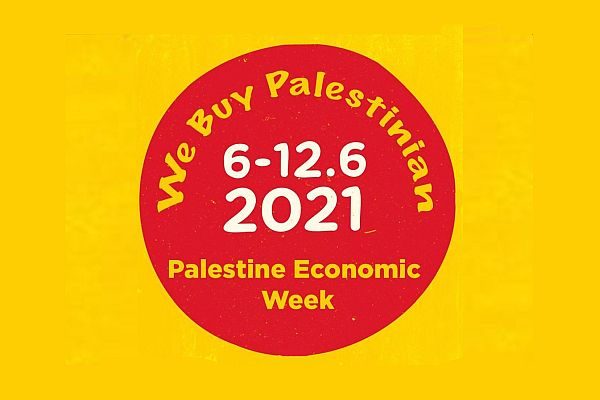This week is Palestinian Economic Week, a call from Palestinians on the ground in historic Palestine to defy Israeli capitalist settler colonialism and support Palestinian businesses and products.
The brutal military occupation of Palestine that started in 1948 extends to an occupation of Palestinian economies and livelihoods. Israel has prevented Palestinian agricultural activity by expropriating our land and waters; they have choked up industrial cities such as Jerusalem, Yaffa and Hebron; they have used checkpoints and colonial borders and controlled harbours to block trade. The purpose of any colonial capitalist regime is to deprive its Indigenous people of self-determination and in Israel this extends to economic independence. Israel robs us of our rich natural resources, drowns us in poverty and unemployment, exploits us as cheap labour, and totally destroys our local means of production.
Palestinian Economic Week is a campaign to direct economic resources into Palestinian communities and economic centres to undermine Israel’s capitalist chokehold over Palestinians. It is organised by Palestinians on the ground, led by the Adalah Justice Project. The group calls on a range of solidarity strategies focused on buying from Palestinian producers, donating to trusted Palestinian organisations, organising for social and political justice for Palestinians, and promoting and strengthening BDS across the world.
Boycott, Divestment and Sanctions is a Palestinian-led movement that aims to pressure the State of Israel to meet its human rights obligations under international law. BDS targets specific companies that are directly or indirectly complicit in Israeli abuses against Palestinians. One of its current campaigns targets Elbit systems, an Israeli defense company that ‘field tests’ its weapons on Palestinians and provides the Israeli military with 85 per cent of its killer drones. Another current campaign targets Puma, the main sponsor of the Israeli Football Association, which includes teams in illegal Israeli settlements.
Like many Palestinians, we have been practicing boycotts our whole lives. We grew up not eating McDonalds, or drinking Coca Cola, or shopping at Marks & Spencer’s, because these brands (among others) were complicit in Israeli war crimes. Boycotts are an important part of the global movement for a free Palestine, and a way for the Palestinian diaspora and their allies in the global community to articulate their objection to the violence of the Israeli state.
Galvanised by the hashtag #SaveSheikhJarrah, there has been greater public awareness of Israel’s settler colonial violence over the last month. However, this awareness runs the risk of being co-opted by the disingenuous solidarity of activist branding and performance politics and undermined by unfounded accusations of antisemitism. The postering of popular Brunswick restaurant Very Good Falafel in recent weeks provides us with a case study on what this looks like. Given the importance of maintaining focus on the unfolding acts of Israeli brutality in Gaza and the West Bank during this critical moment in history, the emphasis on the restaurant’s solidarity for Palestine following this incident raises legitimate questions about what it actually means to stand in solidarity with Palestine and Palestinians.
In recent weeks the storefront of Very Good Falafel (VGF) was postered with material criticising the colonial state of Israel and calling for solidarity with the BDS movement. In the aftermath the restaurant’s owners publicly stated that they were not Zionists, and reached out to members of parliament, local councillors, and other influential figures to make public statements in their defence. They were met with an outpouring of social media support, validation, and calls for consumers to patronise the restaurant amidst accusations of antisemitism.
For decades, Palestinians and pro-Palestine allies, including anti-Zionist Jews, have warned us of the dangers of conflating anti-Zionism with antisemitism. Zionism is a political ideology rooted in white supremacy, settler colonialism, and ethnic cleansing. There is nothing about these things that is embedded in or inherent to Jewishness. The State of Israel weaponises antisemitism to undermine genuine acts of solidarity and prevent people from critiquing their settler colonial project and apartheid regime. The State of Israel makes the occupation and settler-colonisation of Palestine an issue of religion to shut down productive conversations about anti-racism, decolonisation, and human rights.
As Palestinian activists it is disappointing to see meaningful conversations centring Palestinian sovereignty and liberation sidetracked by performative activism more concerned with protecting brands and businesses than giving voice to Palestinians and drawing attention to injustice.
VGF have historically made a range of posts and statements in solidarity for causes such as the #FreeAssange campaign and Invasion Day protests, indicating that they know the importance and value of businesses speaking up on injustice. However, this was the first time they had publicly indicated their stance on Palestine. Whenever members of the local community have attempted to discuss Palestinian solidarity with VGF’s owners and staff their messages have been ignored, and some of their accounts blocked.
This kind of activism raises legitimate questions: is it worth giving more oxygen to an act of local protest or the owner’s responses when Palestinian voices and the Palestinian cause are so much more urgent? Perhaps not, but this situation does demonstrate the limits between superficial consumption politics and real solidarity.
Boycotting as a specific tactic organises people to take collective action against campaign targets complicit in injustice and oppression. Boycott campaigns aim to place economic pressure on these businesses until they respond to the public’s demands. Ethical consumption choices are different. They are individual choices that we make to not consume products that explicitly or implicitly contribute to settler colonisation, apartheid, ethnic cleansing and the broader project of erasing Palestine culture and history. Ethical consumption patterns do not have a mass impact on businesses in the same way that boycott does, but that doesn’t mean they don’t have a place in the fight for justice and liberation – there’s a reason both are strategies of Palestine Economic Week. The power in ethical consumption is its ability to raise awareness and change the narrative on social issues. Having a conversation with someone about why you don’t want to go for dinner with them at businesses such as VGF or Miznon forces people to critically reflect on what injustices they are implicitly supporting through these seemingly harmless, everyday acts.
From our understanding, Very Good Falafel were targeted because of their refusal to present a clear stance on Palestinian oppression despite calls to do so from a community that observed their support for other social justice movements. Obviously, VGF is not a BDS target, and postering it wasn’t a BDS strategy. But that doesn’t make it an illegitimate act of solidarity and civil disobedience in the context of Palestine.
Food is also subject to Israel’s settler colonial project; hummus, falafel, maqloobe, and baklawa have all been appropriated. Most recently, we have seen knafeh (a famous Palestinian dessert hailing from Nablus) being sold at Prahran market as an ‘Israeli’ food. Shakshuka is North African and Mansaf is Jordanian – but both are constantly promoted as ‘Israeli’. Similarly, Falafel is enjoyed across the Arab region – from Palestine to Egypt to Iraq (where one of the VGF owners is from). While many cuisines have been brought to Israel through Arab-Jewish communities, like Sephardi or North African Mizrahi dishes, it is inaccurate to describe these dishes as inherently ‘Israeli’. ‘Israeli cuisine’ is a collage of imported products marketed for a nationalist colonial agenda, and its fashionable status in Melbourne’s ostensibly progressive inner-North is a form of complicity with that agenda.
Palestinian Economic Week is an opportunity for allies to shift from performance politics to genuine economic and political support for Palestinians. People are finally talking and questioning where their food is coming from. VGF’s sudden pro-Palestine stance goes to show that it is becoming unprofitable and unpopular for businesses to not be outwardly pro-Palestine – this is the power of ethical consumption. We need to continue making it a reputational risk for businesses to align themselves with Israel. If you ask a business whether they stand with Palestine and they block you, stop going there. We need to pressure businesses to be openly and actively pro-Palestine, and we need your help doing it. Ask your local grocers and restaurants where they source their couscous, freekeh, pickles, dates, vine leaves. If the answer is Israel, tell them to use a more ethical source. Stop going there until they do. Find a Palestinian alternative instead: you can eat traditional Palestinian Knafeh at Knafeh Nabulseyeh, try vegan Palestinian food at Khamsa Cafe in Newtown, and order Palestinian food produce at Palestine Fair Trade and Sprinkle & Dash.
Jeanine and Lujayn are Palestinian siblings involved in the BDS movement.






